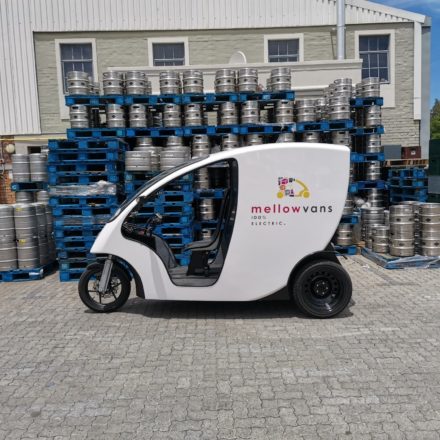
Since 2018, with MyAfricanStartup, Christian Kamayou highlights promising startups through an annual ranking of the "100 innovative African startups@RR
Can you introduce yourself?
I am Christian Kamayou, the founder of AKIBA Business Partners since 2020. As an entrepreneur and consultant specializing in innovation and fundraising strategies, my team, based in Paris, Nairobi, and Douala, provides comprehensive services dedicated to African entrepreneurs and SMEs.
My passion for the development of the African entrepreneurial ecosystem led me to launch the MyAfricanStartup initiative in 2018. This non-profit activity highlights promising startups through an annual ranking of the "100 innovative African startups." Supported by prestigious partners, our goal is to increase the visibility of these startups and guide investors.
A graduate of HEC Paris, I remain active within the HEC alumni committee and am a former Young Leader of the Aspen Institute. The MyAfricanStartup initiative that I created celebrates African ingenuity, encourages investors, and inspires future generations by inviting them to explore the dynamic African entrepreneurial spirit.
The major innovation for 2024 is the launch of 70 captivating video podcasts. Complementary to the brochure, these podcasts showcase the best startups on the continent and enlightened investors. This dynamic initiative provides a unique opportunity to exchange inspiring stories, offering an authentic and valuable glimpse into entrepreneurship in Africa.
What are the principles and objectives of the MyAfricanStartup 100 ranking?
Firstly, I would like to clarify that the "ranking" is a 100-page brochure and not a hierarchical ranking. Additionally, we never issue a call for applications.
The ranking of the top 100 African startups is an initiative aimed at showcasing innovation and the diversity of the entrepreneurial landscape on the African continent. It provides a crucial platform to promote startups, attract investor attention, and foster the economic growth of businesses.
One of the primary motivations of this ranking is to provide visibility for African startups. By highlighting them, the initiative seeks to create investment opportunities, stimulate networking, and encourage successful collaborations among these businesses and other ecosystem stakeholders.
Regarding investors, he ranking facilitates connections between African startups and investors, offering a diverse range of investment opportunities. This contributes to strengthening the confidence of both national and international investors in the potential and quality of African enterprises.
What does this ranking mean for the African startup ecosystem?
By serving as a barometer to assess the evolution of the startup sector in Africa, the ranking identifies emerging trends, thereby encouraging entrepreneurship-friendly public policies. It also helps enhance Africa's reputation as a dynamic innovation hub. Beyond recognition, the ranking inspires the next generation of entrepreneurs by showcasing success stories and demonstrating the numerous opportunities available on the continent. This plays a crucial educational role in encouraging more entrepreneurial initiatives.
This also draw international attention to investment and partnership opportunities in Africa, the ranking contributes to strengthening international ties. The ranking positions the continent as a major player in innovation, thereby contributing to regional and global economic development. In summary, the ranking of the top 100 African startups acts as a catalyst for economic growth, stimulates innovation, reinforces investor confidence, and educates and inspires.
“Our approach is characterized by our commitment to diversity?

You’ve just unveiled the 2023 edition of the ranking. What does it look like?
First, we notice a certain geographic diversity: The most innovative startups in Africa hail from 20 different countries. However, some countries stand out, such as Kenya, in the lead with 22 startups, followed by Nigeria with 21. There is also a certain regional concentration. Kenya, Nigeria, South Africa and Egypt account for 60% of startups. Egypt has made a rapid raise this year, with 4 times more startups in 3 years.
It should also be said that French-speaking Africa is not absent. Among the 20 countries, 7 are French-speaking, with Senegal leading in 4th place with 8 startups. And, women are still under-represented. Only 36% of startups have a female founder or co-founder. In addition, some sectors are performing better than others. Fintech, Logistics and Transportation, and E-commerce sectors represent nearly 50% of the startups. The health (7%), education (5%) and agriculture (4%) are also seeing significant growth.
Finally, 25% of startups raised less than one million dollars. The lowest amount raised was $50,000.
What are the criteria for the ranking?
The selection of startups for the MyAfricanStartup Awards is based on highly relevant and primarily non-financial criteria. We place paramount importance on the proven concept, a robust team, a high degree of innovation, and the scalability of the proposed offering.
Our selection criteria include: innovation, market potential, the experience and skills of the founding members. We also place attach importance to the innovative approach of the startup to solve existing problems or exploit opportunities and its capacity to address specifically African problems on a large scale. But also economic viability.
What sets our approach apart is our commitment to diversity, whether in terms of gender, geography, or other inclusive criteria. For instance, we ensure that no geographic or linguistic area predominates, limit the share of startups from Anglophone countries, promote the participation of women, and encourage sectoral diversity. We welcome companies of different sizes, from startups to more mature entities, demonstrating that the path to success is feasible at every stage, from seed funding to Series B, without imposing revenue criteria.
"Africa, a breeding ground for innovative startups"
What does this 2023 ranking tell us about African startups?
The MyAfricanStartup rankings emerge as a strategic information hub, offering valuable insights for observers, investors, media, and entrepreneurs. It can be used to analyze the sectoral dynamics of African startups and shed light on the evolving market needs and emerging opportunities. The geographical distribution of award-winning startups highlights regions or countries emerging as innovation hubs, providing valuable insights into local startup ecosystems conducive to the emergence of innovative enterprises.
Comparing successive rankings allows for the observation of evolutions over time, identifying growing sectors, transformations in business models, and the impact of economic and technological developments. Distinguished startups offer a glimpse into the latest innovations and creative approaches to problem-solving. There is also a degree of entrepreneurial diversity, whether in terms of gender, ethnic origin, or diverse backgrounds, reflects efforts to promote inclusivity and equal opportunities within the ecosystem.
promote inclusivity and equal opportunities within the ecosystem.
Analyzing fundraising amounts and predominant funding sources provides crucial indications of the overall financial health of the startup ecosystem, highlighting successful economic models.
The MyAfricanStartup startup rankings transcend mere recognition by providing a holistic perspective on innovation, trends, and key players shaping the future of entrepreneurship. It serves as an invaluable window into understanding the dynamics of this ever-evolving ecosystem.
Your analysis of the outlook for the pan-African tech ecosystem:
What does 2024 hold in store?
Africa has long been emerging as a fertile ground for innovative startups. As we approach 2024, the startup landscape on the continent has been characterized by persistent fundraising, reflecting the dynamic and resilient spirit of African entrepreneurship.
In 2023, the African venture capital ecosystem faced global economic challenges. While Western VCs remain cautious internationally, the fundamental growth of Africa remains attractive.
Our advice for entrepreneurs in 2024: Despite a challenging fundraising environment, focus on the fundamentals, preserve cash, and attract investment with efficient capital models.
I think Kenya and climate tech are a key sector and a country to watch. We can also highlight the importance of good governance for the companies in the ranking, as well as customer-focused businesses. Our entrepreneurs are recognized as 'superheroes' in challenging circumstances.
Regarding macroeconomic conditions, despite economic challenges, opportunities persist for resilient companies addressing latent demand. The African financing ecosystem demonstrates its resilience by seeking opportunities in key sectors




